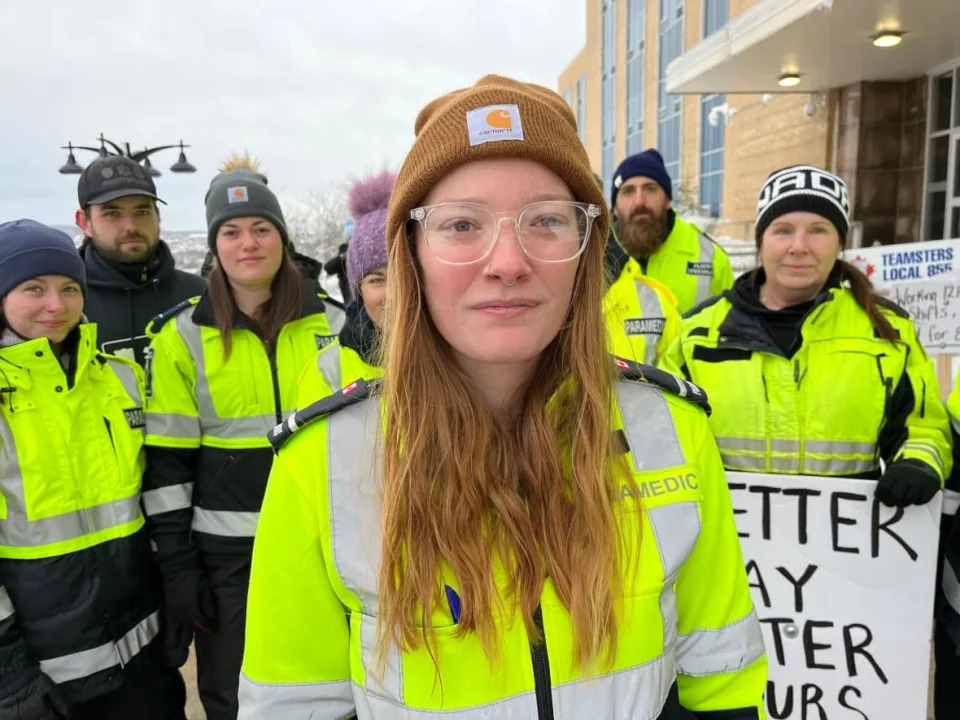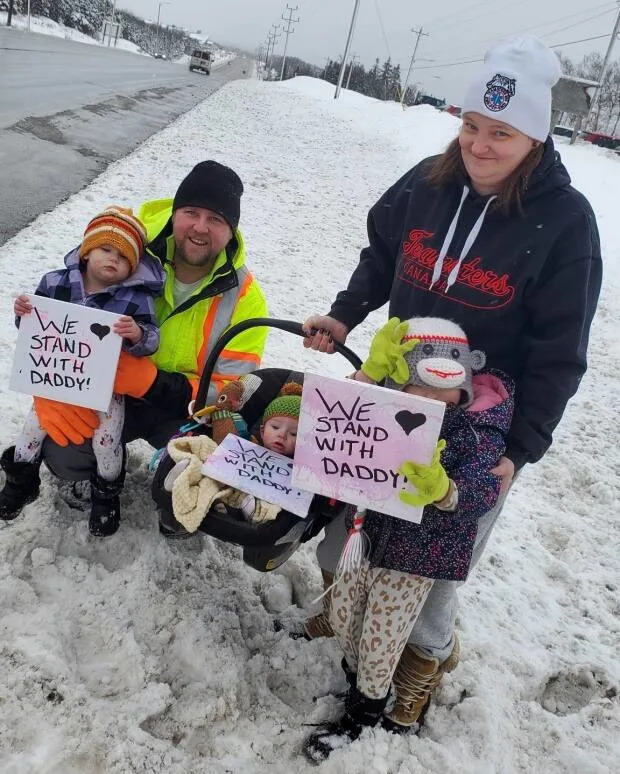CBC Newfoundland and Labrador
Wed, January 25, 2023

Emily White, a paramedic for one of seven companies owned by Bob Fewer, and her colleagues were at Confederation Building on Monday, as elected officials debated a bill to send them back to work with more regulations to help continue negotiations.
(Terry Roberts/CBC - image credit)
More than 100 employees of seven private ambulance services are back to work, but their labour dispute is far from over.
The paramedics and emergency medical responders now have a piece of legislation calling them essential workers, but they can return to the picket line again, as soon as they reach an agreement with their employer on how many people are needed to maintain a minimum standard.
Whether they reach a satisfactory deal or head back to the picket line, Emily White won't stay long.
"A lot of us are leaving this job. I myself am leaving in the next couple of months," the six-year paramedic told CBC News.
White was one of dozens of paramedics protesting outside Confederation Building in St. John's on Monday. They wanted people to know why they were on strike, and the conditions they've been working with for years.
Several medics — who are unionized under Teamsters Local 855 — said they work seven consecutive 24-hour shifts, but are paid for only 11.43 hours per shift.
"I love the job, but [not] the politics and not getting paid," White said. "Only getting 11.43 hours for 24-hour shifts is not right. I don't get a pension plan. I don't have RRSPs. I have nothing in line for my retirement."
More than 100 employees of seven private ambulance services are back to work, but their labour dispute is far from over.
The paramedics and emergency medical responders now have a piece of legislation calling them essential workers, but they can return to the picket line again, as soon as they reach an agreement with their employer on how many people are needed to maintain a minimum standard.
Whether they reach a satisfactory deal or head back to the picket line, Emily White won't stay long.
"A lot of us are leaving this job. I myself am leaving in the next couple of months," the six-year paramedic told CBC News.
White was one of dozens of paramedics protesting outside Confederation Building in St. John's on Monday. They wanted people to know why they were on strike, and the conditions they've been working with for years.
Several medics — who are unionized under Teamsters Local 855 — said they work seven consecutive 24-hour shifts, but are paid for only 11.43 hours per shift.
"I love the job, but [not] the politics and not getting paid," White said. "Only getting 11.43 hours for 24-hour shifts is not right. I don't get a pension plan. I don't have RRSPs. I have nothing in line for my retirement."

Terry Roberts/CBC
All seven striking ambulance services are owned by one man, Bob Fewer. He hasn't responded to any requests from CBC News since the job action began.
Fewer is quoted in a VOCM article published Wednesday as saying he welcomes the new legislation but it will take a long time to get over bad blood created during the strike.
Teamsters Local 855 business agent Hubert Dawe said talks with Fewer have been unproductive from the beginning. Despite months of attempts to negotiate, Dawe said, a written offer was submitted for only one of seven services.
Dawe said "procrastination" was one of the worst problems they faced with the employer and he was glad to see legislation with prescribed timelines for negotiating contracts and settling disputes.
Under the new legislation, if both sides cannot reach an essential services agreement, they can apply to the provincial labour relations board, which will set the terms of the agreement within 45 days. Workers can return to striking after that.
The act also comes with fines, ranging from $500 to $10,000, for breaking the rules set forth.
Should there be a private sector?
Nathanael White was also on the picket line on Monday, outside the James Paton Memorial Hospital in Gander. He works for the ambulance service in Carmanville, where he moved about 12 years ago.
The pay structure and lack of retirement plans have left him worried for his future.
"I watched my neighbour do 23 years in the ambulance service and at the end of the day, all he got was a plaque thanking him for his service. So who's looking after him now?" he said.

Submitted by Carly White
Nathanael White wants to see the private sector pull in line with the public sector on wages and pensions. Better yet, he said, he'd like to see the private service abolished.
"The government has done audits multiple times in the last decade and found issues with the private sector. It should never have been a for-profit model. It should be directly funded by the government and the money should go where it's supposed to go," he said.
The legislation passed on Monday was rare in labour circles. Legislating people back to work is rarely popular, but it was a move welcomed by the union in this case. Along with the essential designation, the legislation set out a roadmap for handling future disputes. If the Teamsters can't reach a deal with Fewer, the matter can be sent to the labour relations board and on to an independent arbitrator.
"The important thing is that we're still able to provide service for our community, but we still have a voice and we're able to get the things we deserve to make our job better," Nathanael White said.
No comments:
Post a Comment